Black Skeptics LA Announces First in the Family Humanist Forward Freethought Awards
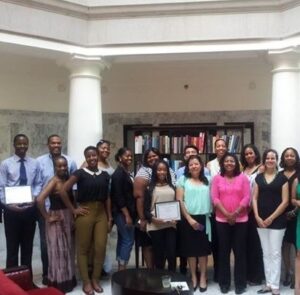 The first cohort of BSLA First in the Family Humanist awardees, 2013.
The first cohort of BSLA First in the Family Humanist awardees, 2013. This article was originally posted on the website of Black Skeptics Los Angeles.
In 2013, Black Skeptics Los Angeles initiated the First in the Family Humanist scholarship awards to provide support for foster care, LGBTQ+, unhoused, and undocumented secular youth of color who will be the first in their families to go to college. Now in its tenth year, the awards have provided two generations of BIPOC secular college students with single and multi-year awards ranging from $2500 to $5000.
Nationwide, Black and BIPOC youth from these vulnerable communities have some of the highest rates of school pushout, mass incarceration/prison pipelining, sexual abuse victimization and housing insecurity. Initially focused on students in the Los Angeles Unified School District, the awards expanded nationally in 2014. Awardees have gone on to prestigious colleges and universities for graduate school, and pursued careers in STEM, business, the humanities, and the arts. Some of our youth have also collaborated with Black Skeptics and the Women’s Leadership Project on initiatives that support LGBTQ+ youth in South L.A. (Victor Marroquin, class of 2016, and Claudia Iraheta, class of 2017), as well as contributed to panels on voting rights (Kola Heyward-Rotimi, Justin Fajar and Jalyn Williams, classes of 2016 and 2020) and Black Gen Z perspectives.
In the midst of un-relenting anti-Blackness and homophobic/transphobic violence in K-12 and higher-education, Black and Latinx secular youth are raising their voices in resistance, pursuing social and educational justice while navigating college and careers. This year, Black Skeptics awarded $5,000 scholarships to four students, Aamir Asadi (UCSC), Nevaeh Brown (University of Illinois), Joseph Carter (Texas Southern University), Nathan Concepcion (Texas A&M), and Jay Silva (Emerson College). In addition, 2021 and 2022 awardees Belen Padilla (Scripps College) and Behanka Adonis (University of Massachusetts-Amherst), each received $2,500 as multi-year recipients. These awards were made possible with generous support from the Freedom from Religion Foundation and the Bredvold Fund. In addition to myself, Tomorrie Cook, Darrin Johnson, and Jessica Robinson served on the scholarship awards committee.
Here are excerpts from our awardees’ essays:
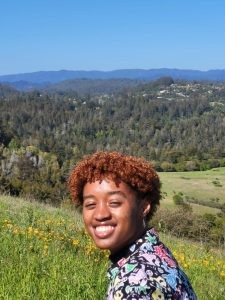 Aamir Asadi (UCSC)
Aamir Asadi (UCSC)
I refuse to believe that a loving god would create the conditions in which white supremacy, genocide, misogyny, and queerphobia could thrive. Humans are influenced by the conditions of our environment, but I also believe that we are capable of free will and spontaneity. If we make the conscious decision to change our environment, we can eliminate systems of oppression at their source to create a better world for everyone. I am passionate about addressing the ways religious institutions further anti-indigeneity and colonialism. As a queer person who was raised Muslim, I am passionate about eliminating homo/transphobia in religious communities and protecting marginalized queer people of color around the world. As a Black person, I have seen the ways institutionalized religion has torn apart our community. I have seen the Black community regurgitate the same rhetoric used to enslave us under the guise of religion.
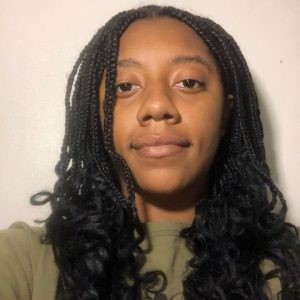 Neveah Brown (University of Illinois)
Neveah Brown (University of Illinois)
As a young Black person who identifies as pansexual, non-binary, and lives with autism, my journey of self-discovery has been one filled with questions, uncertainty, and an unwavering commitment to open-mindedness. This is why I proudly identify as agnostic, as it allows me to navigate the complexities of existence without subscribing to any specific religious doctrine or dogma.
Living in the body of someone perceived to be a Black woman has shaped my perspective in profound ways. It has made me acutely aware of the societal expectations and stereotypes that accompany such an identity. From the assumption that I am strong and resilient to the fetishization of my blackness, my experiences have revealed the urgent need for inclusivity, understanding, and equality.
My journey has also taught me the importance of embracing my own unique identity. As someone who identifies as pansexual and non-binary, I exist beyond the confines of traditional sexual and gender norms. This realization has deepened my understanding of the complexities of human existence and reinforced my commitment to embracing diversity and challenging societal norms.
Identifying as agnostic allows me to explore and question the nature of spirituality and existence without subscribing to rigid beliefs. It provides me with the freedom to critically analyze various religious and philosophical perspectives, while remaining open to the possibility of something beyond our current understanding. By acknowledging the limitations of human knowledge, agnosticism fosters humility, curiosity, and an appreciation for the vastness of the universe.
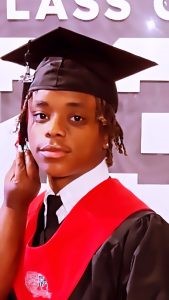 Joseph Carter (Texas Southern University)
Joseph Carter (Texas Southern University)
As I proudly wear the mantle of a non-religious/secular individual, my identification as a secular humanist unleashes a torrent of reason, compassion, and a resolute dedication to shaping a better world. By addressing humanist issues such as social justice and education in my community, I strive to ignite a flame of change that permeates through the very fabric of our society. Secular humanism stands as a guiding light, illuminating our path towards empathy, critical thinking, and the unyielding pursuit of human dignity. Together, let us unleash the transformative power of secular humanism and forge a future where reason, compassion, and collective progress reign supreme.
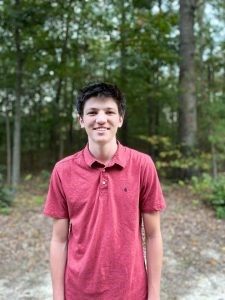 Nathan Concepcion (Texas A&M University)
Nathan Concepcion (Texas A&M University)
I identify as non-religious/secular because I believe in the principles of humanism, which prioritize the equitable treatment of every human being regardless of their race, gender, sexual orientation, class, or disability status. Humanism, to me, represents a moral framework that is based on reason, empathy, and the inherent worth and dignity of all individuals. By embracing secular humanism, I reject the notion that social change should be driven by divine authority or supernatural beliefs. Instead, I recognize that it is human beings themselves who hold the power and responsibility to create a more just and inclusive society. One humanist issue that I am deeply passionate about addressing in my community is social and economic inequality. I firmly believe that every individual should have equal opportunities to thrive and succeed, regardless of their background or circumstances. In my community, I have actively engaged in initiatives that aim to address this issue. For example, I have volunteered at local organizations that provide resources and support to marginalized communities, such as food banks and homeless shelters. By offering assistance and advocating for policies that promote social and economic justice, I strive to create a more equitable society where everyone can access the resources they need to lead fulfilling lives. Secular humanism has the potential to make a positive difference in creating social change by promoting critical thinking, evidence-based decision-making, and a focus on human well-being. By encouraging individuals to question traditional norms and beliefs, secular humanism fosters an environment of intellectual curiosity and openness. It encourages people to base their actions and decisions on reason and empirical evidence, rather than relying on unfounded assertions or dogmatic beliefs.
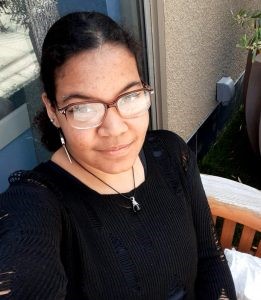 Jay Silva (Emerson College)
Jay Silva (Emerson College)
I am a major advocate for self-love and care. I believe you are responsible for your own happiness, and, while others can help with your general mood, you are the person in the end who decides how you want to look at things. I believe this for all emotions. You are fully responsible for how you feel and how you perceive something. While I am completely respectful of those who put their faith in a higher power, I personally do not resonate with a god. The idea of there being a higher power controlling what happens in my life directly conflicts with my belief that I am in charge of my own thoughts, feelings, and perceptions. As a member of the LGBTQIA+ community and a Black woman, I have been hit hard with racism and homophobia. I want to shed light on those issues and I believe secular humanism will help with that. Believing in karma or that a god will get back at those who hurt you doesn’t make sense to me. I don’t want to wait for karma to strike those who have said mean things to me. I would rather raise awareness about those things and deal with racism and homophobia directly. With secular humanism, people will see that they are the ones that can help face the problem and they won’t need to wait around for a god to fix everything.
My family is heavily religious, and, by default, I also used to be. I prayed every night and went to church. I put my faith in Jesus and I waited for him to save me from the bad things in life. I feel as though I was a good kid. I was kind to everyone, prayed, went to church, and I didn’t curse or bad mouth anyone. Despite this, I still faced a lot of racism. When I came out as pansexual, I was faced with homophobia as well, even from my own family. They used God against me, saying my sexuality was a sin. It was then that my beliefs changed. Why would I believe in something that didn’t agree with who I was? As soon as I let go of religion, I felt happier.
